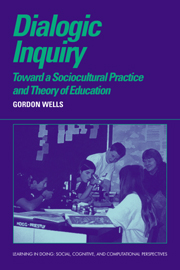
-
Select format
-
- Publisher:
- Cambridge University Press
- Publication date:
- 09 November 2009
- 28 August 1999
- ISBN:
- 9780511605895
- 9780521631334
- 9780521637251
- Dimensions:
- (228 x 152 mm)
- Weight & Pages:
- 0.75kg, 392 Pages
- Dimensions:
- (228 x 152 mm)
- Weight & Pages:
- 0.54kg, 392 Pages
You may already have access via personal or institutional login
Book description
For more than a quarter of a century, the polemics surrounding educational reform have centered on two points of view: those who favor a 'progressive' child-centered form of education, and those who would prefer a return to a more structured, teacher-directed curriculum, which emphasizes basic knowledge and skills. Vygotsky's social constructivist theory offers an alternative solution, placing stress on co-construction of knowledge by more and less mature participants engaging in joint activity together, with semiotic mediation as the primary means whereby the less mature participants can seek solutions to everyday problems, using the resources existing in society. In addition to using illustrative examples from classroom studies, a comparative analysis of the theories and complementary developments in works by Vygotsky, and the linguist M. A. K. Halliday, are provided. This unique volume will be of tremendous benefit to those in the field of education, as well as to sociolinguists, psychologists and researchers.
Reviews
"An important contribution. . . . Dialogic Inquiry is a challenging book to read, both because it raises serious questions about many of the assumptions underlying cognitive science and because it tackles difficult theoretical questions without avoiding their complexity. . . Wells has demonstrated. . . that the sociocultural perspective has a great deal to offer our understanding of thinking, knowing, language and learning." Contemporary Psychology
Contents
Metrics
Altmetric attention score
Full text views
Full text views help Loading metrics...
Loading metrics...
* Views captured on Cambridge Core between #date#. This data will be updated every 24 hours.
Usage data cannot currently be displayed.
Accessibility standard: Unknown
Why this information is here
This section outlines the accessibility features of this content - including support for screen readers, full keyboard navigation and high-contrast display options. This may not be relevant for you.
Accessibility Information
Accessibility compliance for the PDF of this book is currently unknown and may be updated in the future.


